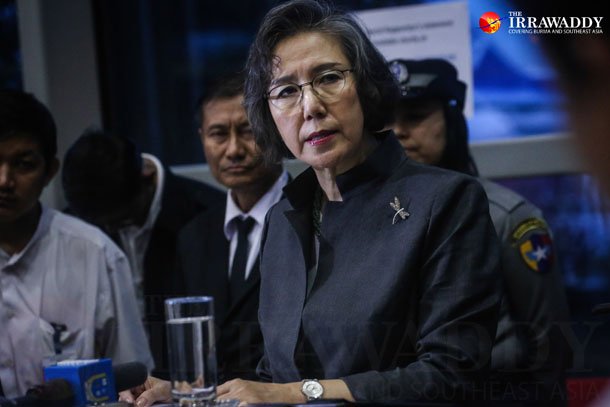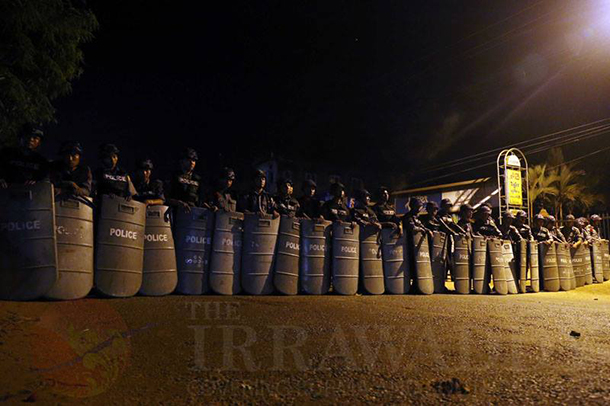Posts Tagged ‘Arakan State’ (147 found)
UN Myanmar Rights Expert: Backtracking on Democratic Space Gains Momentum in Election Year
YANGON / GENEVA (19 January 2015) – “Valuable gains made in the area of freedom of expression and assembly risk being lost,” United Nations Special Rapporteur Yanghee Lee said at the end of her ten-day official visit* to the country. “Indeed, there are signs that since my last visit, restrictions and harassment on civil society and the media may have worsened.” […]
• • •The Facts are Plain and Stated. It is Time to Act!
 The US Special Envoy for Human Rights in Burma, US Assistant Secretary of State Tom Malinowski and his accompanying delegation, completed the second trip of this kind, highlighting the plethora of grave human rights concerns that continue to plague the people of Burma. On the same day, the UN Special Rapporteur on the situation of human rights in Burma, Yanghee Lee, also gave a stark analysis of progress in human rights.
The US Special Envoy for Human Rights in Burma, US Assistant Secretary of State Tom Malinowski and his accompanying delegation, completed the second trip of this kind, highlighting the plethora of grave human rights concerns that continue to plague the people of Burma. On the same day, the UN Special Rapporteur on the situation of human rights in Burma, Yanghee Lee, also gave a stark analysis of progress in human rights.
The two day, US-Myanmar Human Rights Dialogue visit included meetings with Union ministers in a closed door arrangement in Naypyidaw as well as meetings with civil society in Rangoon and Myitkyina, the capital of war-torn Kachin State. The 10-day trip of Special Rapporteur Yanghee Lee also included meetings with various government and civil society representatives, as well as visits to the site of the Letpadaung Copper Mine, Insein Prison, Arakan State, and Lashio, northern Shan State.
• • •Statement of the Special Rapporteur on the Situation of Human Rights in Myanmar
Today is the final day of my second official visit to Myanmar as Special Rapporteur on the situation of human rights in Myanmar. It has been a visit rich in its diversity, geography, viewpoints and experiences. I have engaged with government officials, parliamentarians, religious and community leaders, civil society representatives, victims of human rights violations and members of the international community. My discussions have been frank, open, sometimes passionate but always welcoming. I am feeling more and more a part of this country and am privileged to be accompanying the people of Myanmar on this journey of reform towards greater enjoyment of human rights. My visit would not have been possible without the genuine cooperation of the Government of Myanmar and the committed support of the United Nations Country Team. I wish to express my sincere appreciation to both organisations […]
• • •Burma: Amend Biased Citizenship Law
(New York) – The Burmese government should accept the United Nations call to amend the discriminatory law that deprives Rohingya Muslims of Burmese citizenship, Human Rights Watch said today in a letterto President Thein Sein.
On December 29, 2014, the UN General Assembly adopted a resolution calling on the Burmese government to amend the 1982 Citizenship Law so that it no longer discriminates against the Rohingya. Successive Burmese governments, including the current administration of Thein Sein, have used the law to deny citizenship to an estimated 800,000 to 1.3 million Rohingya by excluding them from the official list of 135 national races eligible for full citizenship […]
• • •UN Special Rapporteur Yanghee Lee Should Focus on Violations of International Law
Burmese Rohingya Organisation UK today called on UN Special Rapporteur Yanghee Lee to make violations of international law against the Rohingya the main focus when she visits Rakhine State, Burma.
Burmese Rohingya Organisation UK is also calling on Yanghee Lee to recommend that UN Secretary General Ban Ki-moon personally take the lead in negotiating international humanitarian access in Rakhine State […]
• • •Myanmar: UN expert to assess human rights situation in Rakhine and Northern Shan States
GENEVA (5 January 2015) – The United Nations Special Rapporteur on Myanmar, Yanghee Lee, will undertake her second official visit to the country from 7-16 January 2015. Ms. Lee will gather first-hand information on the current human rights situation in the Rakhine and Northern Shan States, among other issues […]
• • •Statement from First European Rohingya Conference
Europe based Rohingyas held a very first conference in Esbjerg, Denmark from 27th to 28th December 2014. All Rohingya organizations in Europe joined to work collectively for the suffering of Rohingyas in Arakan State and to raise stronger voice against quasi-civilian Burmese government […]
• • •Four years on, no clear answers on Kaladan Project
[Rangoon, Burma/Myanmar] The Kaladan Movement today urges the governments of Burma and India and Indian company ESSAR Projects Ltd. to publicly answer vital questions about the implementation of the Kaldan Multi-Modal Transit Transport Project (Kaladan Project) and address key concerns of affected communities in Arakan and Chin States […]
• • •Poorly Planned Census in Disarray as Calls for Postponement Grow Stronger
 Enumerators arrived in Arakan State on Sunday, 30 March in the company of three hundred armed policemen who were brought into the area in several army trucks to conduct the nationwide survey. The first national census since 1983 should be vital in planning the nation’s needs in health, education and development. However, the census has triggered violence in Arakan State, as humanitarian aid offices were raided, aid workers fled, local aid workers threatened not to assist the Rohingya, and aid to the Rohingya communities living in internally displaced camps has halted.
Enumerators arrived in Arakan State on Sunday, 30 March in the company of three hundred armed policemen who were brought into the area in several army trucks to conduct the nationwide survey. The first national census since 1983 should be vital in planning the nation’s needs in health, education and development. However, the census has triggered violence in Arakan State, as humanitarian aid offices were raided, aid workers fled, local aid workers threatened not to assist the Rohingya, and aid to the Rohingya communities living in internally displaced camps has halted.
So far three people – two under the age of five – have died as a result of the absence of medical care and food prices are soaring as water and food becomes scarce. The Burma government has rescinded their commitment to allow Rohingya’s to self-identify, folding under pressure from Arakanese Buddhists to boycott the census. The tension in Arakan State is spreading throughout Burma as an anti-Muslim riot took place in a town on the outskirts of Rangoon, where an angry Buddhist mob pelted Muslim-owned properties with stones[…]
• • •Myanmar: UN expert raises alarm on Rakhine State
GENEVA – The United Nations Special Rapporteur on the human rights situation in Myanmar, Tomás Ojea Quintana, today pressed the alarm bell on the further deterioration of the human rights situation in Rakhine State […]
• • •








 All posts
All posts